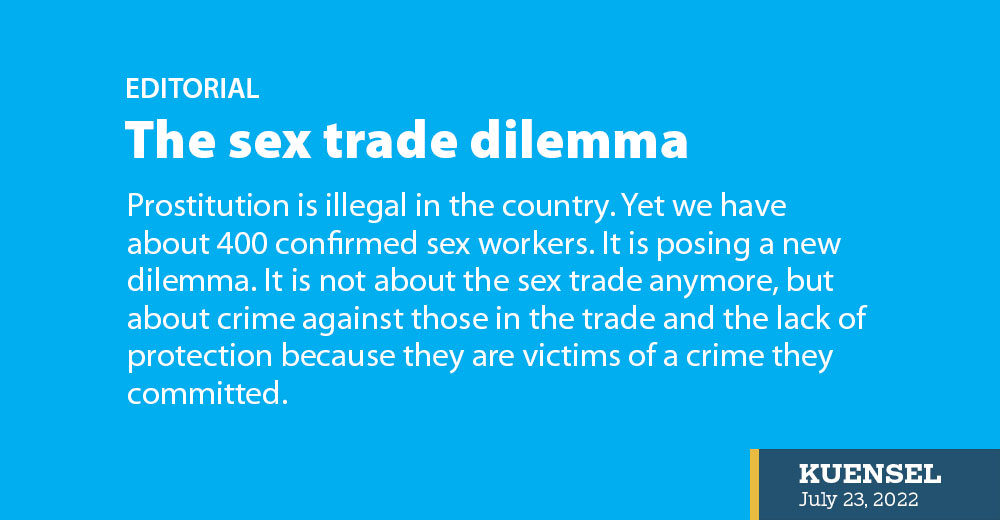Prostitution is illegal in the country. Yet we have about 400 confirmed sex workers. It is posing a new dilemma. It is not about the sex trade anymore, but about crime against those in the trade and the lack of protection because they are victims of a crime they committed.
In short, when the sex trade is criminalised, women both young and old are exposed to both exploitation and violence. The report on violence against sex workers is three years old, but the concerns are genuine and relevant. More women could have gone into the trade and more could have been subjected to violence, abuse, harassment or blackmail since then.
Following the report, there are calls for legalising the sex trade. There are an increasing number of women caught up in the trade and there are many coming into conflict with law. Above all, we cannot give them protection from being exploited from all sides.
Prostitution is an incredibly dangerous profession. Sexual assault, physical abuse and forced drug addiction and even death is common in this trade. For the women in the trade, it is often difficult to get help, as indicated by the report. They are criminals for prostituting.
The sex trade is undesirable from all angles. There is health risk, religious and social inhibitions and as a country propagating happiness, it’s about loss of image if we let our women sell their body to make a living. There are implications of making it a profession for the underprivileged or the unemployed. But the reality is it cannot be stopped either.
A lot has changed since sex trade became an issue, especially at the border towns where those involved (women) were mostly from across the border. Today we are talking about our own girls and women -including students getting trapped in the trade.
It is a serious issue that needs attention and discourse to find solutions.
The debate about legalising the flesh trade is as old as the industry. There are both pros and cons. Licensing the sex trade, it is claimed, will protect women, improve safety and prevent the spread of diseases. Doing so, some argue, will increase trafficking of women and children into the industry.
It is not a new debate. Developed countries have studied and tested it for decades. Some made it legal, others decriminalised and some criminalised it. Many point to the fact that whenever or wherever sex was criminalised, sex workers have been moved to places where they are more exposed to different kinds of risks: assault, fraud, control, and lack of freedom.
The debate here, we surmise is one-sided. It is not so much about the concern for the health and safety of women. The main reason is that prostitution is viewed as amoral because it involves women, maybe men too now, selling their bodies for money.
Perhaps a way out of the dilemma would be to decriminalise prostitution. It would mean removing criminal penalties and encouraging women to report violence or abuse against them to authorities. Criminalising drives the business underground, away from safety and protection.
It would be hard for a small close-knit society to see brothels in our towns. That is unacceptable. But when we cannot control and pretend that we are clean, it begets problems. Above all, what we have to understand is that prostitution is not a choice. If we can make their lives better by decriminalising their job, if we can help them by providing alternatives, we would be helping those in the trade.


